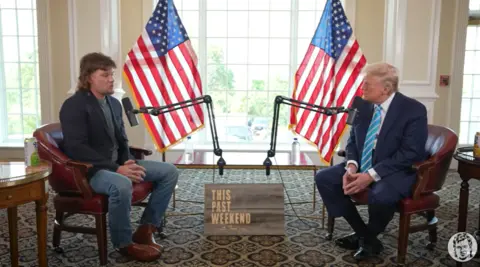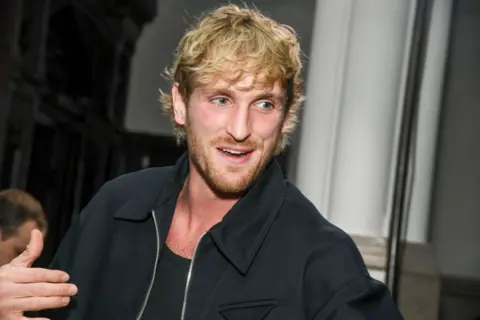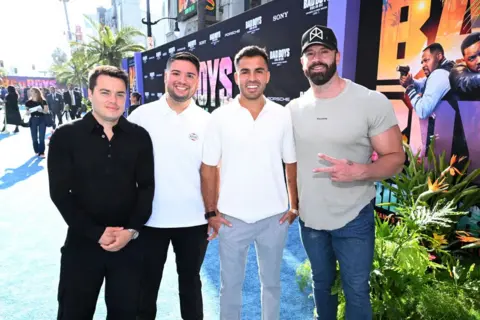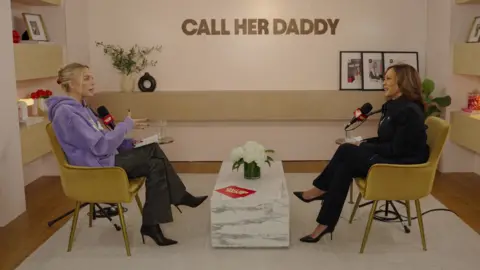
 Theo Von / YouTube
Theo Von / YouTubeDonald Trump has appeared on numerous shows to huge audiences of young men, giving interviews to influencers, comedians and podcasters outside the usual political media. What is his strategy?
About 15 minutes into Donald Trump's conversation with comedian Theo Von, the conversation veered into territory not usually heard in a stump speech.
“I had a wonderful brother who taught me not to drink. Don't drink and don't smoke,” said the former president. “I admired him a lot… And he had a drinking problem.”
“I've been in recovery for most of the last 10 years,” Von replied. “Drugs and alcohol”.
Trump seemed genuinely interested.
“What's worse?” he asked. They then talked at length about addiction and the drug industry.
Politics wasn't entirely absent – Trump returned after a few minutes, alluding to his complaints about the “deep state” and the voting system – but the friendly chat was a perfect example of the campaign's broader strategy.
Trump conducted a series of interviews with podcast creators and alternative media that collectively constitute a concerted effort to reach young men.
While this tactic isn't new – Trump has been appearing in alternative, male-dominated media with large audiences for months since last year – it takes on greater importance in the final stages of the election.
In August, the Trump campaign told reporters it was targeting a key group of voters that make up just over a tenth of the electorate in swing states. They are mostly younger men, most of them white, but this group includes more Latinos and Asian Americans than the general population.
They also believe they can reach these often fickle voters by putting Trump on shows hosted by people like Von, internet pranksters the Nelk Boys, YouTuber Logan Paul and Adin Ross, a live-streaming gamer who has been repeatedly banned from sites for violating the offensive language policy.
The Nelk Boys are reportedly spearheading a voter registration drive on Trump's behalf that they hope will reach a like-minded audience.
 Getty Images
Getty ImagesAlthough they are not household names in the mainstream media world, these podcasts have an audience of millions. Von's interview with Trump has nearly 14 million views on YouTube.
Polls show the political gender gap among young people has widened since Kamala Harris became the Democratic nominee in July. Overall, the VP appears to be attracting more young people to her camp, but her support is growing faster among young women than among young men.
A recent Harvard Youth Poll shows that 70% of women under 30 support Harris, while 23% plan to vote for Trump. Among men in the same age group, 53% support Harris and 36% support Trump.
Daniel Cox, director of the Survey Center on American Life, part of the conservative think tank of the American Enterprise Institute, says the political gender gap reflects larger social divisions that make many young men feel that few politicians care about them.
“Trump is very good at turning situations into zero-sum games,” Cox says. “Young men are trying to understand their place in a society that is rapidly evolving as they, as a group, face greater academic challenges, mental health issues and rising suicide rates.
“These are very real concerns and in the political sphere there is a feeling that no one supports them,” he said.
But Trump's podcast tour is less about politics, Cox says, than about “showing up” and speaking in a different style to a different crowd.

The attempt to change the atmosphere is evident in his recent podcast interviews, in which the most relaxed former president chats about golf and mixed martial arts and the politics of Maga-world. It is assumed that these are common sense, not controversial topics that need to be broken down. and debated.
Before chatting about addiction on Vona's show, Trump praised Ultimate Fighting Championship fighters, including Dustin Poirier, who demonstrated more than just ordinary knowledge of the sport.
“Boy, let me tell you, he's a fighter,” Trump said. “The man he was fighting was tough…he was getting stronger as the fight went on.”
Von didn't object — in fact, he readily agreed — when Trump made a slew of baseless and erroneous claims about voting, immigration and the border, including claiming that “hundreds of thousands of murderers” had entered the country.
There's a lot of confusion in the podcasting community, but sometimes the hosts seem excited, respectful, and even nervous. Before one chat, the Nelk Boys recorded a video of themselves drinking cans of their own brand of alcoholic seltzer to calm down before Trump entered the room.
But their audiences don't demand tough questions or detailed policy positions.
“A lot of young people aren't looking for hard news,” Cox says. “Their first interest may be in cryptocurrencies or video games, and politics comes later – through the side door, not the front door.”
 Getty Images
Getty ImagesThere are other signs that Trump is definitely turning to male voters – such as filling the stage at the Republican National Convention with the likes of Kid Rock, Hulk Hogan and UFC CEO Dana White, rather than being introduced – as was the case at previous conventions – by his daughter Ivanka.
Judging by the comments below the podcast's interviews, many viewers and listeners already support the former president, but getting him to the polls could be a real challenge.
Voting rates among young people are generally lower, with young men voting slightly less often than young women.
Harris' campaign is also creating its own podcast, aimed at young women. The vice president recently appeared on the popular sex and relationships episode of “Call Her Daddy,” where she, too, faced some less-than-aggressive questioning.
 Reuters
ReutersGarrett, a twenty-something Logan Paul fan from Houston, runs his own YouTube channel called Spy Jay.
He said he found Paul's brand of “being a maverick” attractive and had a generally positive opinion of Trump before watching the interview, calling him “a patriotic nationalist who wants to return the country to its former, better state.”
“Yet the persecution he faces, despite a constant media push to rewrite who he is and what he represents, means a greater evil is at play,” he said. “And that makes me more willing to be open-minded about voting for him.”
Trump's following on Paul's podcast – the internet star asked Trump if he had ever been in a fight – and Trump's interview with Adin Ross only reinforced his views, Garrett told the BBC.
Garrett said he thinks young Americans are becoming more engaged in politics and that Trump is tapping into the alternative media space “like no other candidate has done before.”
“Whether it's a good strategy or a bad one, it will reach a good number of young people,” he said.
Responses to the online video were generally positive. “Nobody can convince me that Trump isn't just a bro,” one said, while another read: “Love Trump or hate him, he definitely knows how to make an interview entertaining.”
But some experts question whether Trump has much room to expand his voting base among the largely male subcultures where he has long enjoyed support.
“Trump already seems to have captured the manospheric and hypermasculine over-25 person, so this is a late-stage and rather desperate attempt to become relevant,” said Jack Bratich, a media professor at Rutgers University who studies male-overloaded online spaces known as “manosphere”.
Young men who are extremely active online were very active during the 2016 election campaign, when political memes and fringe message boards like 4chan gained popularity, Bratich says.
He says the situation is very different eight years later, as “no identifiable right-wing youth political movement on the Internet” has become heavily involved in this year's competition.
But he notes that the risks to Trump are low and the benefits potentially high.
Whether it pays off will depend on convincing young men who are not inclined to get involved in politics to log off and head to the polls.
Like so many things in this election, the games for younger voters are full of unknowns.

